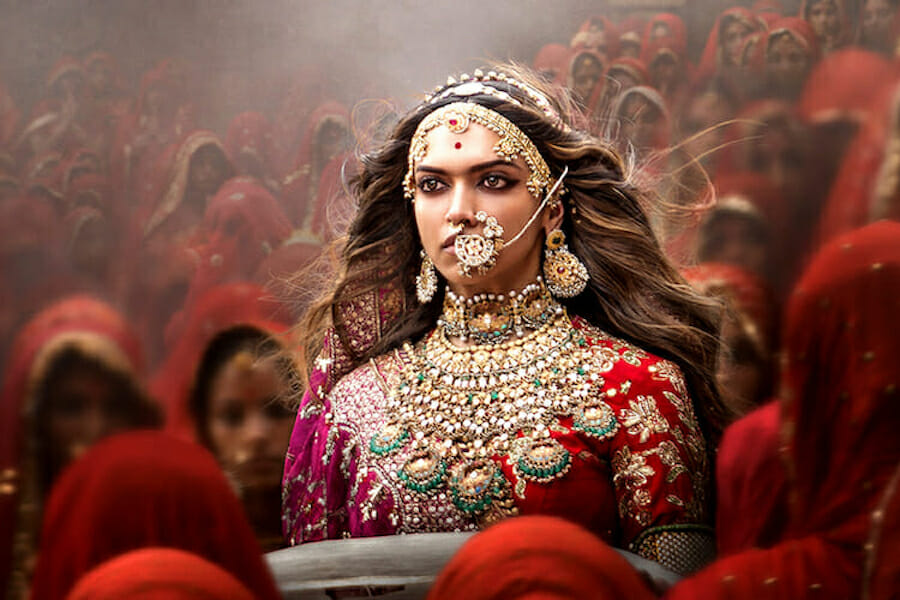
‘Padmaavat’ Review
“I have made up the story and related it.” This is the playful, 4th-wall-breaking closing line of Muslim poet Malik Muhammad Jayasi’s 16th-century epic, Padmaavat. Half a millennium later, the Padmavat story has been revived on film by Sanjay Leela Bhansali, a director who relishes storybook narratives. Bhansali reunites stars Deepika Padukone and Ranveer Singh in the trio’s first film since 2015’s Bajirao Mastani, another medieval royal romance.
Padukone stars as the mythical Queen Rani Padmavati, the 2nd wife of Shahid Kapoor’s King Ratan Singh, who was based on a real king of Chittorgarh. The couple first meets in the opening scene, wherein Padmavati accidentally shoots Singh while bow-hunting. This delicious irony sets up the film’s main theme: upending gender power dynamics.
Just as the King and Queen are about to consummate their marriage, Singh stabs and exiles a Peeping Tom, his priest Raghav Chetan, in one of the film’s many instances of intertwining sexuality, violence and insanity. The banished Brahmin seeks refuge with Ranveer Singh’s murderous, lecherous Sultan Alauddin Khilji. Khilji was a real-life Muslim king from Afghanistan who conquered Delhi. The vengeful Chetan convinces Khilji to invade Chittorgarh, so that he can seize the beautiful Padmavati, an Indian Helen of Troy.
Khilji’s army of Muslim outsiders, wielding a banner that looks uncannily like Pakistan’s flag, lays siege to Hindu Chittorgarh, setting in motion an epic of battle of wills between the Sultanate and Singh’s kingdom. Though Ranveer Singh does a great job of portraying Khilji as a madman with his manic, award-worthy performance, one can’t help but to also notice the questionable leadership of his nemesis. Singh is slavishly beholden to royal decorum. He insists that his subjects celebrate Diwali and Holi like there isn’t a gargantuan army right outside the city gates. He bends over backwards to treat Khilji with respect, at one point even refusing to kill him. Singh gives as an excuse his legacy. He would rather preserve his honor in the history books than the well-being of his besieged citizens.
The true voice of reason lies not with the kings, but with Padmavati and the women of the court; they embody Padmavati’s values of “spirituality, love and sacrifice.” Padmavati possesses ruthlessness and rationality befitting of a royal, advising at one point that Singh kill Khilji. She knows that Khilji and his army pose an existential threat to Chittorgarh. Later, Padmavati goes against the wishes of everyone in the court by agreeing to marry Khilji in Delhi; her loving self-sacrifice ensures that her subjects might be spared from being massacred. Then, the Indian Helen of Troy engineers an ingenious military stunt reminiscent of the Trojan War.
When the women of Chittorgarh inevitably face defeat, they take it with cool-headed honor. When Padmavati’s handmaid loses her son to fighting, she doesn’t bat an eye, instead continues to focus on the city’s situation. Of course, the story’s notorious climax is jauhar, ritual mass suicide-by-fire. Rather than submitting to rape and enslavement by Khilji and his victorious army, Padmavati and the women of the court jump into a bonfire, in one of the most uncomfortable, yet breathtaking scenes in film history. Whereas the armies of Singh and Khilji kill each other in lust-induced madness, the women of Chittorgarh choose death because of their clarity. They choose not to die over chivalry or lust, but to maintain their chastity; for them, death is preferable to having their bodies and souls trapped by rapist soldiers.
It’s incredibly ironic that Padmaavat has been so vociferously protested; it’s been banned in 4 Indian states, has triggered deadly riots inspired threats of mass suicide, and compelled BJP chief media coordinator Suraj Pal Amu to offer $1.6 million to anyone who beheads Padukone and Bhansali. Rationalizing his state’s banning of the film, Haryana health minister Anil Vij said, “Rani Padmavati is the symbol of Indian women’ pride. The character assassination of Padmavati will not be tolerated at any level.” This couldn’t be further from the truth. Deepika Padukone channels one of the most powerful female portrayals of Desi femininity since Nargis in Mother India.
The slander and death threats thrown at Padukone, as well as the censorship push, exposes the hypocrisy of these paternalistic extremists. They try to silence a real Indian icon (Padukone) to preserve the sanctity of a fictitious Indian icon (Padmavati). To use a Raghav Chetan quote to reiterate the reality of Queen Padmavati, “She is an illusion.” I would strongly advise audiences to overlook the censorship push and treat themselves to the timeless story, rich performances and stunning 3-D visuals of Padmaavat.
